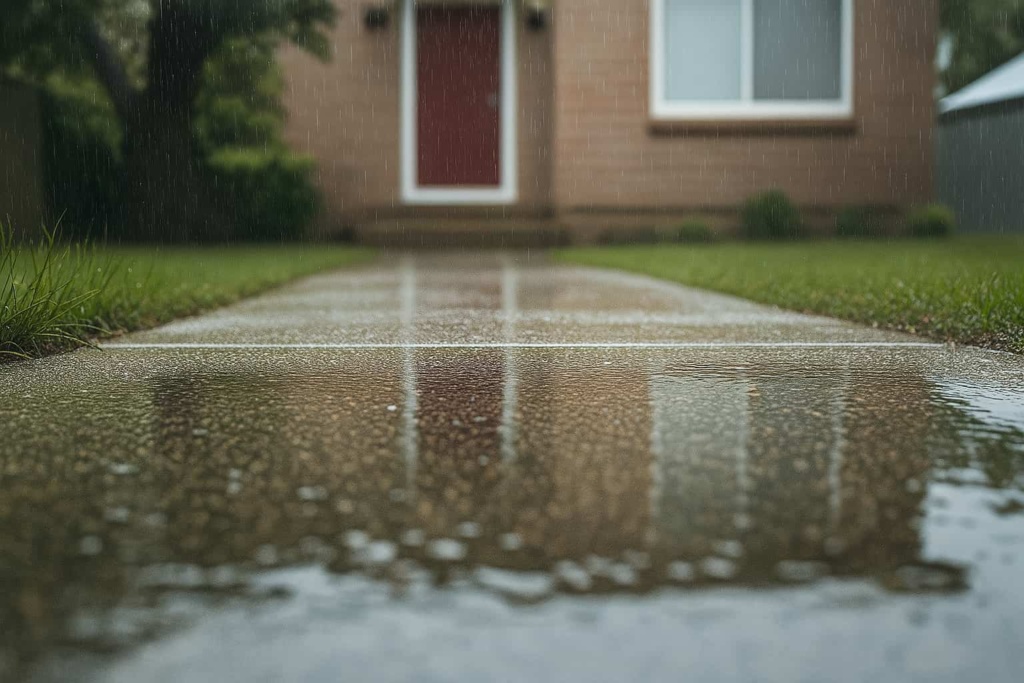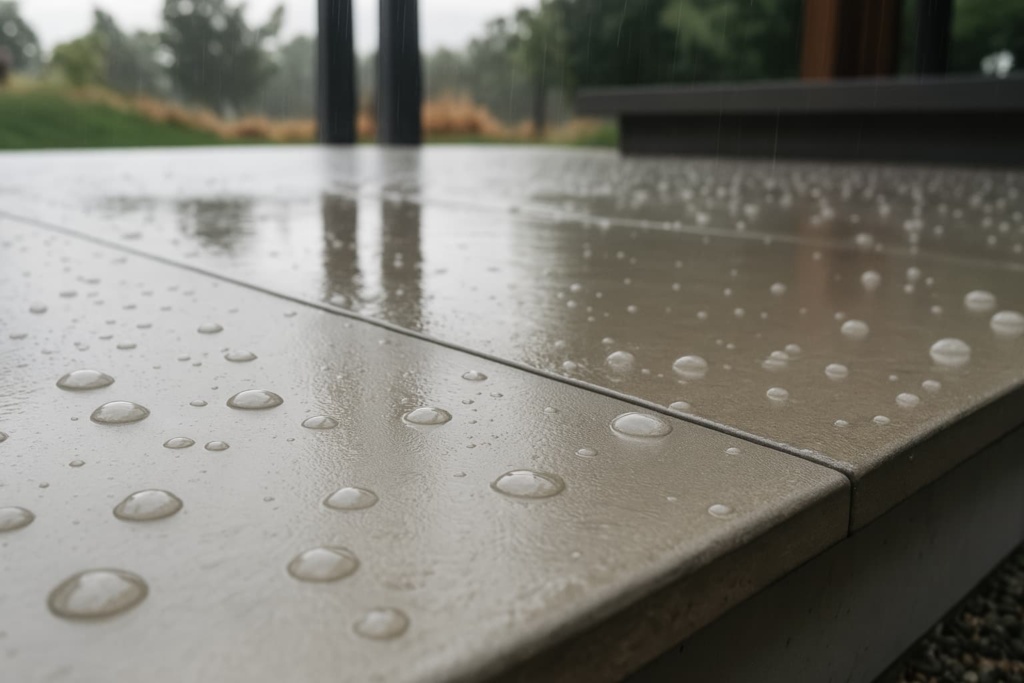How to Maintain Exposed Aggregate Concrete During the Winter Months
- July 2, 2025
- Written By Brad Russell
- Guides

Looking after exposed aggregate in winter isn’t just about keeping it looking good — it’s about protecting your investment.
While Perth’s winters aren’t extreme, colder weather, rain, and reduced sunlight can still impact the condition of exposed aggregate concrete. Moisture build-up, poor drainage, and lack of maintenance during this season can lead to surface dullness, staining, or even cracking over time.
The good news? With a few simple maintenance steps, you can keep your exposed aggregate looking fresh and structurally sound all year round. Whether it’s a driveway, alfresco, or pathway, the right care before and during winter will extend the life of your concrete and preserve its natural beauty.
In this blog, we’ll walk you through practical winter care tips to help your exposed aggregate withstand the season — and come out looking just as good when spring rolls around.
Key Winter Care Tips for Exposed Aggregate
Exposed aggregate is built to last — but winter weather can still wear it down without the right maintenance. Here’s how to protect your surface as the temperature drops:
Regular Cleaning
During winter, fallen leaves, dirt, and debris can trap moisture and cause staining. Because exposed aggregate has a textured surface, it’s more prone to holding onto this buildup.
-
Sweep regularly with a stiff outdoor broom
-
Rinse with a hose or low-pressure washer to remove grime
-
Use a pH-neutral cleaner if needed — avoid anything too harsh
-
Don’t scrub with wire brushes or metal tools that could dislodge stones
Keeping your surface clean helps prevent long-term discolouration and keeps the concrete looking sharp through the colder months.
Re-Sealing for Winter Protection
Sealing is your best defence against winter moisture. It helps prevent water from seeping into the surface, which can lead to cracks or surface erosion over time.
-
Re-seal every 3–5 years depending on wear, weather and sun exposure
-
Penetrating sealers help protect below the surface, while topical sealers offer added shine
-
Always seal before winter, not during — moisture needs to be fully out of the surface first
If your exposed aggregate is looking dull or patchy, or you’re not sure when it was last sealed, consider a reseal or full polished concrete overlay for added protection and renewed finish. For older surfaces, our team can also assist with honed aggregate or re-finishing options.
Read more here: Can You Cover or Resurface Exposed Aggregate Concrete?
Protecting Exposed Aggregate from Cold-Weather Damage
Winter brings more moisture and less sunlight — a tough combo for concrete surfaces if they’re not properly prepared. Here’s how to prevent the most common forms of damage:
Avoid De-Icing Salt
De-icing salts might be common in colder regions, but they’re a bad idea for exposed aggregate — even in Perth’s mild winters.
-
Salt can break down the surface over time, leading to erosion and staining
-
It encourages water absorption, which can worsen freeze-thaw damage
-
The chemicals may also react with the concrete sealer, reducing its lifespan
Instead, opt for sand or fine gravel to improve traction in slippery areas without compromising the surface.
Repair Cracks Before They Spread
Small cracks can quickly worsen in winter as moisture seeps in and expands during cold nights. The earlier you repair them, the better.
-
Inspect your exposed aggregate for hairline or wider cracks before winter
-
Clean the area thoroughly and use a flexible, weather-resistant concrete filler
-
Reseal the surface after repairs to help blend and protect the patchwork
If the damage is widespread or the surface is showing signs of age, you might consider a fresh finish using our exposed polished aggregate system — offering a smoother surface with a sealed, weather-resistant top layer.
Read more here: How to Fix Exposed Aggregate Concrete
Preparing for Winter Storms and Freeze-Thaw Cycles
Even in Perth, winter can bring heavy downpours and chilly mornings. If water is allowed to sit on or soak into your concrete, it can cause long-term damage. Here’s how to prevent it:
Keep the Surface Covered During Prolonged Rain
If you’ve got freshly poured or resealed exposed aggregate, it’s worth protecting it during heavy rain or storms — especially in areas that don’t drain well.
-
Use breathable tarps or plastic sheeting to keep excess moisture off
-
Avoid covering with non-permeable materials for too long — trapped condensation can create other problems
-
Pay extra attention to shaded areas or those near garden beds where water tends to pool
Temporary protection goes a long way, especially if the concrete was recently installed or resealed.
Manage Water Flow and Drainage
Standing water is one of the biggest winter risks. If water pools on the surface, it increases the chance of surface wear, discolouration, and cracking.
-
Ensure gutters and downpipes aren’t dumping water directly onto concrete areas
-
Check that paths and driveways slope away from the home and don’t allow water to sit
-
Consider adding strip drains or surface grates for problem areas
-
If drainage is an ongoing issue, we can help during resurfacing or new installations to improve fall and flow
Good drainage design is just as important as the concrete mix itself — and it makes winter care much easier.
Keep Your Concrete Looking Its Best All Winter
Taking a few simple steps now can save you costly repairs down the line. By cleaning regularly, sealing when needed, and keeping an eye on drainage and cracks, your exposed aggregate will stay strong and attractive through winter and well beyond.
Whether you’re looking to reseal, resurface, or repair damaged concrete, we’re here to help. At Decorative Concrete WA, we’ve been trusted in Perth for 15+ years to deliver exposed aggregate finishes that are durable, low maintenance and built to last.
Need help getting your concrete winter-ready?
Contact our team for an obligation-free quote or expert advice on resealing and repairs.
We don’t believe in cutting corners — just long-lasting, great-looking concrete surfaces that handle Perth’s winter weather with ease.

